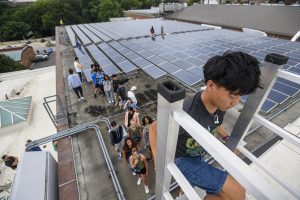Watching your student discover what they’re capable of is exciting, and our pre-college programs are designed to make that happen. Developed by Johns Hopkins scientists and engineers, these courses combine real college-level rigor with hands-on exploration, teamwork, and real-world problem solving. Along the way, students gain confidence, strengthen their STEM skills, and can even earn college credit.
Hopkins Engineering Innovation Pre-College provides a preview of the college experience designed for academically motivated students with an interest in getting a head start in their transition from high school. Our programs are different from traditional STEM summer camps and after school programs, they are college-level courses with college-level standards. Students who enroll in Hopkins Engineering Innovation Pre-College will be immersed in an academically intense, fast-paced college environment for the duration of the program.
Engineering Innovation courses are designed to mirror college-level work. As a result, your student may find the expectations to be an adjustment if they’re used to high school coursework. Encourage them to use available support resources and to reach out to their instructor or advisor whenever they need help.
Time commitments vary by course and format.
Biomedical Engineering Innovation (BMEI) is a college-level, online asynchronous course with a weekly time commitment of about 14–20 hours during the summer and 7–10 hours during the fall or spring. The same material taught to first-year biomedical engineering students at Johns Hopkins over a 16-week semester is completed in six weeks (summer) or fourteen weeks (fall/spring). BMEI is primarily asynchronous, giving your student flexibility to manage their schedule. They’ll need to meet assignment deadlines, attend three required design reviews, and may join optional study sessions with a teaching assistant. We recommend planning ahead and balancing other commitments—such as jobs, internships, or additional coursework—before enrolling.
Explore Engineering Innovation (EEI), offered in commuter, hybrid, online synchronous, and residential formats, is a college-level course requiring approximately 38 hours per week for in-person formats and 28 hours per week for online formats. The same material covered by first-year Johns Hopkins engineering students in a 16-week semester is completed in four weeks (residential, commuter, hybrid) or five weeks (online). Because of the condensed and intensive schedule, we strongly discourage students from taking other courses or major time commitments (jobs, internships, sports, etc.) while enrolled. Commuter and online students have slightly more flexibility, but your student should still consider their full schedule before enrolling.
Intro to Python is a college-level, online asynchronous course that requires an average of about 7.5 hours per week during the six-week session. While there are no mandatory meetings, optional weekly study sessions provide additional support and opportunities to connect with instructors and peers.
Sustainable Energy Engineering (SEE), offered in commuter, online synchronous, and residential formats, is a college-level course requiring about 38 hours per week. Because of the condensed, immersive schedule, residential students are strongly discouraged from taking other courses at the same time. Commuter and online students have more flexibility but should still plan carefully to balance jobs, internships, or extracurricular activities before enrolling.
Wanting to invest in your student’s future, but looking for need-based financial assistance? We understand! Scholarship opportunities are important to us. Engineering Innovation is pleased to offer need-based scholarships to qualified students.
Part of the Hopkins Engineering Innovation Pre-College experience is going through an application and enrollment process similar to what students will do as an undergraduate in college. Students should complete the application themselves with help and guidance from you.
As parent(s)/guardian(s), you are encouraged to pay close attention to both the Financial Aid Application and Parent Information and Agreement tabs within the application, but you should not fill out the forms for the student. It is especially important that the email address associated with the application belongs to the student as it will be the primary means of contact during the application process, enrollment, and the course.
Parents/guardians of individuals under the age of 18 in attendance at a university program that does not offer a postsecondary degree or certificate shall retain FERPA (Family Educational Rights and Privacy Act) rights for the participant. This means that parents/guardians of students under the age of 18 can access the student’s records and grades.
Generally, we communicate by email directly with prospective and current students and via MS Teams with our current students. We do not communicate directly with parent(s)/guardian(s) or other third parties. Please be sure your student checks email daily to ensure they receive important communications.
General Questions: Engineering Innovation office ei@jhu.edu or 443-927-1986
Residential Questions: Summer Discovery office – phone and email will be provided before the programs begin
Academic Questions: Engineering Innovation office ei@jhu.edu or 443-927-1986
Academic Questions for ISPEED in BME: ispeed@jhu.edu
Student Disability Services Questions: studentdisabilityservices@jhu.edu or 410-516-4720
International Student VISA Questions: Office of International Services ois@jhu.edu or 667-208-7001
Admission to the Hopkins Engineering Innovation Pre-College programs do not automatically entitle students for admission into the undergraduate program at Johns Hopkins University.
Courses offered by Hopkins Engineering Innovation Pre-College qualify for tax credit. This means that students who provide their US Social Security number when they enroll will receive a 1098-T tax form in the mail at the address on file with JHU Student Accounts. The form can be filed with their, their parent(s)/guardian(s), tax returns.
The 1098-T can be obtained electronically by clicking the “View 1098-T” link in SIS Self-Service and providing consent. You can provide your ‘Consent to receive your 1098-T electronically’ at any time, before December 31 of the tax year. By clicking on Consent, you are stating that you want to receive your 1098-T form electronically and you agree to return to this site, to print your 1098-T form online or email the form to your email address. You can find more information about the 1098-T form on the Homewood Student Affairs website.
If you have questions regarding this form, you should contact Student Accounts directly through JHU SEAM.
Take A Look Around!
Check out our different program offerings to see what would work best for your student.
